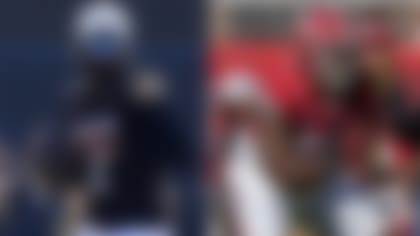When I last saw Gene Upshaw, on June 29 at the annual NFL Rookie Symposium in Carlsbad, Calif., I had no idea he was ill.
I did think he looked a bit thinner than at any time I had seen him in recent years, but no real alarms sounded about the health of the man I had known since I began covering the NFL in the 1970s.
He still had the piercing eyes. He still had the booming voice. He still had the commanding presence of a leader.
He seemed as strong and as vibrant as ever.
Upshaw and I spoke briefly before he was to take the stage and address 252 members of the draft class of 2008, assembled for several days of schooling about life in the NFL. As always, he was engaging, bringing up stories of mine that he had read on NFL.com and referencing my weekly show on Sirius Radio. He had done this many times before with me and with other writers and broadcasters, just to let us all know that he was paying attention to us just as we were paying attention to him.
A large part of what made Upshaw very good at his job as executive director of the NFL Players Association was his media savvy -- his awareness of the importance of cultivating and utilizing the forum so many of us readily provided so that he could give the NFLPA perspective on football business … not to mention a good deal of rhetoric.
And whenever Upshaw was behind a microphone, you could almost always count on him to say something that would grab everyone's attention. His speech to the rookies was no exception. Upshaw didn't care that this was an NFL-sponsored event. Putting any sense of political correctness aside, he addressed his audience about a comment Commissioner Roger Goodell had made a week earlier that it was "ridiculous" for rookies to receive lucrative contracts before they even set foot on an NFL field and that the issue needs to be addressed in upcoming labor talks.
"I think it's ridiculous that you would make such a comment," Upshaw said. He later added that "We, at the NFL Players Association, represent you. Roger Goodell represents the 32 owners."
Although the commissioner wasn't at the symposium, plenty of administrators from the league office were. To say that Upshaw's comments caused some uncomfortable moments would be an understatement.
Yet, that was Upshaw. Tough. Unrelenting.
His in-your-face style had served him well for 15 seasons as an offensive lineman for the Oakland Raiders. After his Pro Football Hall of Fame career, it continued to serve him well in the hierarchy of the NFLPA.
It isn't easy doing business with mega-wealthy team owners, especially when your mission is to put the largest possible share of their revenue into the hands of the players. Upshaw was on the front lines for multiple labor disputes, including some nasty ones that involved work stoppage and replacement players.
He was tenacious, battling toe-to-toe with powerful titans of corporate America. He also was intelligent, understanding the intricacies of the ever-expanding finances of the league. And, often to the chagrin of the owners, he never lost sight of the core element of what allowed the NFL to enjoy incredible growth and continued prosperity -- the players.
That was why Upshaw was relentless in his pursuit of unrestricted free agency. That was why he forged a cooperative relationship with former commissioner Paul Tagliabue. And it was on Upshaw's watch that players, after four years in the league, gained the freedom to move from team to team and receive unprecedented salaries in doing so.
Upshaw drew harsh criticism for his perceived coziness with Tagliabue, who, upon becoming commissioner in 1989, had made it his goal to gain Upshaw's trust and put an end to the considerable acrimony that had developed between the NFL and the NFLPA. Tagliabue knew, in the long run, it would be much better for both sides to function more as partners than adversaries. So did Upshaw.
The result was uninterrupted labor peace and the league soaring to the top of all sports brands -- drawing billions in television and sponsorship dollars along the way -- while also establishing itself as a global entity.
Yet, things weren't always smooth or easy between Tagliabue and Upshaw.
"In both careers (as a player and NFLPA executive director), if you hit him in the head, he could hit you back twice as hard," Tagliabue said. "But he didn't always do so. He was very tough but also a good listener. He never lost sight of the interests of the game and the big picture."
Upshaw had plenty of challenges within the ranks of the NFLPA. He was criticized, largely because of how well he got along with Tagliabue, for giving in too easily to the owners in collective bargaining agreement extensions through the years. He also was criticized for not doing enough for former players in dire need of financial help to deal with mounting medical costs from lingering physical problems from their playing careers.
Yet, it was the last extension, in 2006, that might have done the most to preserve Upshaw's legacy as someone who mostly did right by the players. Although the owners approved the deal, they later concluded they were giving players too large a piece of the revenue pie and last June exercised their option to allow the CBA to expire after the 2010 season.
Still, there was rampant speculation of a movement in place for Upshaw's ouster and to select his replacement even with labor talks set to begin in earnest this fall.
If Upshaw were ill or carrying any sort of extra burden when I last saw him, he did a great job of keeping it all to himself. We said we would be in touch with each other, which, of course, is what a lot of us say at the end of a conversation. But I was truly expecting to speak with him again because I knew he would be at center stage as CBA negotiations heated up.
I am saddened that won't be the case.
With Upshaw's passing, the NFLPA lost its most dynamic leader. The NFL lost a link to its glorious past and an influential and instrumental figure in its glorious present.
Have a question for Vic on anything NFL related? Don't just sit there -- send it to AskVic@nfl.com, and the best questions will be answered throughout the season right here on NFL.com.



